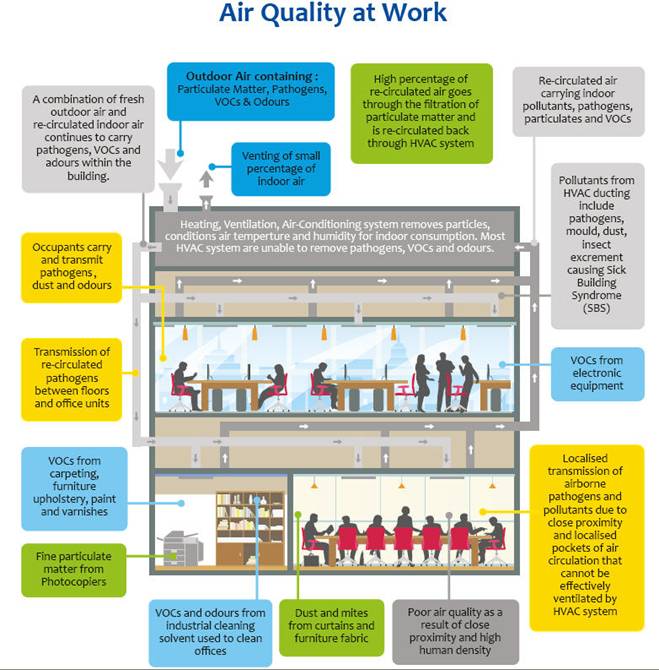News
Air quality is key contributor to employee productivity
 Admit it, we all knew this intuitively. But now there’s hard research to back up the claim that employee productivity is linked to indoor air quality.
Admit it, we all knew this intuitively. But now there’s hard research to back up the claim that employee productivity is linked to indoor air quality.
In a recently published article titled (take a deep breath) “Associations of Cognitive Function Scores with Carbon Dioxide, Ventilation, and Volatile Organic Compound Exposures in Office Workers: A Controlled Exposure Study of Green and Conventional Office Environments,” researchers from Harvard University, SUNY-Upstate Medical University, and Syracuse University found that workers in well-ventilated buildings with low pollutant concentrations demonstrated better cognitive function than counterparts working in conventionally built offices.
“Exposure to CO2 and VOCs [volatile organic compounds] at levels found in Conventional office buildings was associated with lower cognitive scores compared to levels in a Green building,” the authors explain.
In the study, 24 workers were exposed to different air quality conditions over a period of six days. The physical work environment was kept the same, but participants were exposed to different environmental conditions each day to simulate conventional buildings (high VOC concentrations), green buildings (low VOC concentrations), and so-called green+ buildings, which are green buildings with with high ventilation rates.
Researchers tested subjects’ cognitive abilities in nine categories throughout the study:
- Basic activities: General ability to make decisions at all times
- Applied activities: Ability to make decisions geared toward overall goals
- Focused activities: Ability to pay attention to immediate situations
- Task orientation: Ability to make decisions geared toward completing a specific task
- Crisis response: Ability to plan and strategize in emergencies
- Information seeking: Ability to gather information from diverse sources
- Information usage: Ability to use information in pursuit of overall goals
- Breadth of approach: Ability to combine different lines of thinking and use a variety of options to achieve goals
- Strategy: Ability to apply well-integrated solutions, aided by optimal information and planning
Researchers aggregated scores in each of these areas into a combined score and found that participants working in green buildings with low pollution concentrations scored more than 60 percent higher than those in conventional buildings. Furthermore, when subjects were placed in a green+ environment, in which low pollution was combined with high ventilation rates, cognitive ability soared a full 100 percent higher than when that observed under conventional conditions.
“This study was designed to reflect indoor office environments in which large numbers of the population work every day,” the article concludes. “These exposures should be investigated in other indoor environments, such as homes, schools and airplanes, where decrements in cognitive function and decision-making could have significant impacts on productivity, learning and safety.”
Indoor air quality is a key component of employee productivity and contributes to the success of businesses whose most important assets work in well-ventilated spaces. Contact us on your next building project and let CPP help you ensure that your occupants enjoy a space that is safe, comfortable, and efficient.
